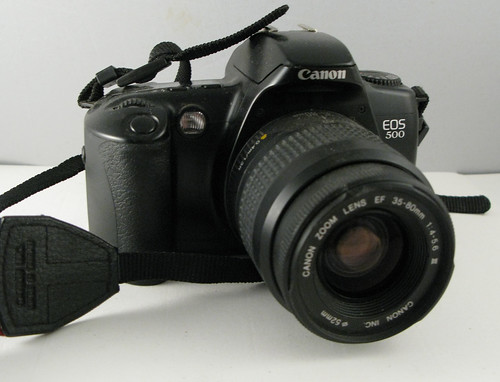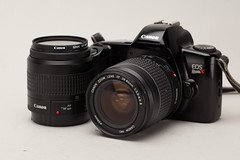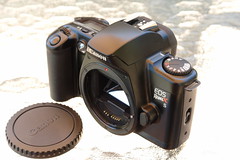Difference between revisions of "Canon EOS 500"
m (→Links: updated canon camera museum link) |
(typos) |
||
| Line 12: | Line 12: | ||
The '''EOS 500''' is a entry level 35mm [[autofocus]] [[SLR]] introduced by [[Canon]] in 1993. It is known as the '''EOS Rebel XS''' in the North American market and the '''EOS Kiss''' in Japan. A nearly identical model without flash was available in the American market called '''EOS Rebel X'''. The model successors are the [[Canon EOS 500N|EOS 500N]] released in 1996. | The '''EOS 500''' is a entry level 35mm [[autofocus]] [[SLR]] introduced by [[Canon]] in 1993. It is known as the '''EOS Rebel XS''' in the North American market and the '''EOS Kiss''' in Japan. A nearly identical model without flash was available in the American market called '''EOS Rebel X'''. The model successors are the [[Canon EOS 500N|EOS 500N]] released in 1996. | ||
| − | It has a electronic vertical travel [[focal plane shutter]] with speeds from 30s to 1/2000. There is a built-in pop up flash with a GN of 12. Flash sync is at 1/90 a sec. The metering system features silicon photo diode with evaluative, central partial and center-weighted average metering modes. The meter has a range of 2 to 20 EV at (ASA 100, 50mm f/1.4), and can be set for film speeds from 6 to 6400 ISO. The mode dial is used for exposure modes which includes, aperture priority, shutter priority, | + | It has a electronic vertical travel [[focal plane shutter]] with speeds from 30s to 1/2000. There is a built-in pop up flash with a GN of 12. Flash sync is at 1/90 a sec. The metering system features silicon photo diode with evaluative, central partial and center-weighted average metering modes. The meter has a range of 2 to 20 EV at (ASA 100, 50mm f/1.4), and can be set for film speeds from 6 to 6400 ISO. The mode dial is used for exposure modes which includes, aperture priority, shutter priority, depth of field AE, manual exposure and a program mode with scene selections such as portrait, landscape, close-up, sports, and night. An [[exposure compensation]] modes is available from -2 to +2 in 1/2 stops. |
| − | The film loading is automatic and prewinds the film onto the take-up spool, because | + | The film loading is automatic and prewinds the film onto the take-up spool, because the exposure counter is downward-counting. Film advances up to 3 frames per second. It uses two 3V CR123A lithium batteries. |
{{br}} | {{br}} | ||
Revision as of 02:01, 14 January 2023

|
| Canon EOS 500 image by Rachel Rayns (Image rights) |
For the identical named digital SLR camera see Canon EOS Rebel XS.
The EOS 500 is a entry level 35mm autofocus SLR introduced by Canon in 1993. It is known as the EOS Rebel XS in the North American market and the EOS Kiss in Japan. A nearly identical model without flash was available in the American market called EOS Rebel X. The model successors are the EOS 500N released in 1996.
It has a electronic vertical travel focal plane shutter with speeds from 30s to 1/2000. There is a built-in pop up flash with a GN of 12. Flash sync is at 1/90 a sec. The metering system features silicon photo diode with evaluative, central partial and center-weighted average metering modes. The meter has a range of 2 to 20 EV at (ASA 100, 50mm f/1.4), and can be set for film speeds from 6 to 6400 ISO. The mode dial is used for exposure modes which includes, aperture priority, shutter priority, depth of field AE, manual exposure and a program mode with scene selections such as portrait, landscape, close-up, sports, and night. An exposure compensation modes is available from -2 to +2 in 1/2 stops.
The film loading is automatic and prewinds the film onto the take-up spool, because the exposure counter is downward-counting. Film advances up to 3 frames per second. It uses two 3V CR123A lithium batteries.
Gallery

|
| EOS Rebel X image by cvilleshutterbug (Image rights) |

|
| EOS Rebel XS image by Mario Groleau (Image rights) |